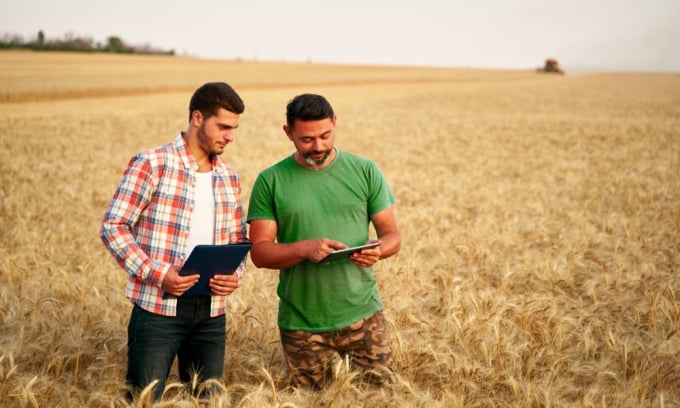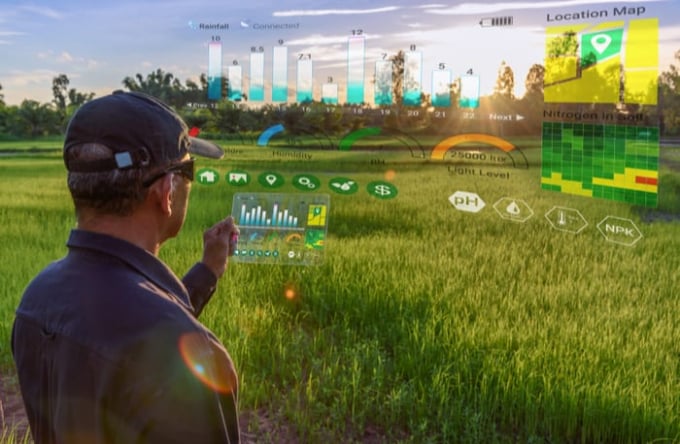June 17, 2025 | 17:21 GMT +7
June 17, 2025 | 17:21 GMT +7
Hotline: 0913.378.918
June 17, 2025 | 17:21 GMT +7
Hotline: 0913.378.918

Gardin’s optical sensors can accurately detect abnormal growth effects caused by underwatering at a much faster rate than would have been observed through naked eye inspections.Photo: Getty
As a sign of growing investor interest, Oxford, U.K.-based agricultural technology firm Gardin recently announced it had raised $10.8 million in a seed funding round, after raising $1.2 million in pre-seed funding earlier this year.
Commenting on the funding, Gardin Founder and CEO Dr. Sumanta Talukdar said that with the technology that is becoming available, food can be better, tastier and more secure. “What’s more, the systems that provide it, if managed sustainably, can contribute to the health of our planet rather than advance its decline,” Talukdar said.
Edel Coen, head of Dealflow at U.K.-based Molten Ventures, which led the funding round, added, “There are more people, more waste and less land available than ever before: food security and sustainable food production are now enormous challenges we are experiencing on a global scale. ... Gardin’s unique technology enables a step-change in how and where food can be produced.”
Launched in 2020, the London-headquartered startup aims to optimize food production, using machine learning and remote optical sensors to provide growers with data to determine plant health, instead of traditional farming methods which involve manually assessing or conducting chemical analyses that can be harmful to the produce.
For example, Gardin’s optical sensors can accurately detect abnormal growth effects caused by underwatering at a much faster rate than would have been observed through naked eye inspections.
According to a statement, the funding will be used to further expand its product lineup with crop forecasting and nutritional density mapping capabilities, while marketing the technology to greenhouses and vertical farms across Europe and North America.
Another U.K.-based AgTech firm, Intelligent Growth Solutions (IGS), recently raised 42.2 million pounds in a Series B funding round, bringing its total funding to more than 52 million pounds ($68.7 million).
The Scottish startup supplies growers with sophisticated indoor vertical farming technology to enable the efficient production of food anywhere across the globe.
Companies like global payments giant have also been looking to innovate AgTech and build a more inclusive and productive agricultural supply chain worldwide. In October 2020, Mastercard announced a partnership with Texas-based GrainChain that ties the company’s agricultural supply chain technology solution into Mastercard’s proprietary blockchain technology.
And earlier this year, PYMNTS reported on technology billionaire Bill Gates’ vision of building new “connected” smart cities and farms, using artificial intelligence (AI), geodata, resource management and other tech to optimize crop yields from every acre of land.
Last year, the philanthropist announced the launch of a nonprofit, Gates Ag One, to support these efforts, as well as “speed up efforts to provide smallholder farmers in developing countries, many of whom are women, with access to the affordable tools and innovations they need to sustainably improve crop productivity and adapt to the effects of climate change.”
Mastercard Launches Digital Sales Platform For Farmers

Mastercard and Rabobank are partnering to offer a digital platform to 1 million farmers in emerging markets. Photo: Getty
Mastercard and Rabobank are partnering to offer a digital platform to 1 million farmers in emerging markets, Mastercard said in a press release on Wednesday (Sept. 25).
The product will make it easier for farmers to sell produce and builds on the Mastercard Farmer Network. Rabobank’s Banking for Food vision reaches agricultural regions in Europe, Africa and Asia.
“At Mastercard, we envision a world in which economic growth is truly inclusive,” said Arjan Bol, Netherlands country manager for Mastercard. “Mastercard Farmer Network contributes to this by offering a digital platform that makes it safer and simpler for small-holder farmers to grow their business. Through close collaborations with important partners as Rabobank, we are able to create even more impact, putting the digital economy to work for everyone, everywhere.”
The partnership will grow across Uganda, Tanzania, Kenya, Ghana, Egypt and India. Farmers in these countries have limited finance options.
Mastercard Farmer Network launched in 2015 and has connected with over 250,000 farmers in Uganda, Tanzania and India. The solution connects farmers with buyers through a common digital infrastructure.
“We believe that sustainable partnerships in the food and agri value chain are key to guaranteeing food security in the future,” said Wiebe Draijer, CEO Rabobank. “This partnership creates a unique opportunity to expand access to the formal economy and financial services for hundreds of thousands of farmers. By joining forces with Mastercard we address both of our goals to increase financial inclusion in the agri-sector, while also contributing significantly to Rabobank’s Banking for Food strategy.”
Other AgTech innovations include Barclaycard’s introduction of a commercial card product in conjunction with AGCO Parts, a supplier of parts and after-sales services for the farming machinery space. Announced in May, the credit card will be issued by Barclaycard and is designed to support U.K. farming businesses. Users can obtain additional benefits from the card, including an extended interest-free credit period when they make purchases at participating AGCO dealers.
Iron Ox is opening its first fully autonomous production farm and planned to start selling its own produce. The crops are tended by a robot dubbed Angus, a 1,000-pound machine that can lift and move the large hydroponic boxes in which the produce grows, and also has a robotic arm that harvests the produce.
(Pymnts.com)

(VAN) Extensive licensing requirements raise concerns about intellectual property theft.

(VAN) As of Friday, a salmonella outbreak linked to a California egg producer had sickened at least 79 people. Of the infected people, 21 hospitalizations were reported, U.S. health officials said.

(VAN) With the war ongoing, many Ukrainian farmers and rural farming families face limited access to their land due to mines and lack the financial resources to purchase needed agricultural inputs.

(VAN) Vikas Rambal has quietly built a $5 billion business empire in manufacturing, property and solar, and catapulted onto the Rich List.

(VAN) Available cropland now at less than five percent, according to latest geospatial assessment from FAO and UNOSAT.

(VAN) Alt Carbon has raised $12 million in a seed round as it plans to scale its carbon dioxide removal work in the South Asian nation.

(VAN) Attempts to bring down the price of the Japanese staple have had little effect amid a cost-of-living crisis.